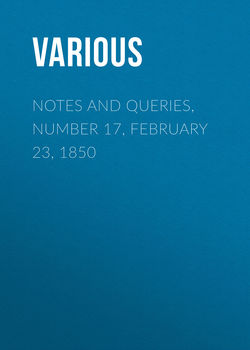Читать книгу Notes and Queries, Number 17, February 23, 1850 - Various - Страница 3
NOTES
ON AUTHORS AND BOOKS, NO. 5
ОглавлениеAs a writer of dedications, Samuel Johnson was the giant of his time. He once said to Boswell, the subject arising at a dinner-party, "Why, I have dedicated to the royal family all round,"—and the honest chronicler proves that he spoke advisedly.
Compositions of this nature admit much variety of character. A dedication may be the pure homage which we owe to merit, or the expression of gratitude for favours received, or a memorial of cherished friendship; and such dedications, in point of motive, are beyond the reach of censure—I may fairly assert, are very commendable. Nevertheless, Johnson left no compositions of either class: "the loftiness of his mind," as Boswell gravely states, "prevented him from ever dedicating in his own person."
A more equivocal sort of dedication also prevailed. A book was supposed to require the prefix of some eminent name as its patron, in order to ensure its success. Now the author, though very capable of writing with propriety on his chosen theme, might be unequal to the courtly style which dedicators were wont to display, and as the complement was to be returned substantially, he might be tempted to employ a superior artist on the occasion. It was chiefly under such circumstances that the powers of Johnson were called into action. By what arguments the stern moralist would have endeavoured to justify the deception, for it deserves no better name, is more than I can undertake to decide, and I submit the query to his enthusiastic admirers.
To the dedications enumerated by the faithful Boswell, and by his sharp-sighted editors, Malone and Croker, I have to announce on internal evidence, a gorgeous addition! It is the dedication to Edward Augustus, Duke of York, of An Introduction to Geometry, by William Payne, London: T. Payne, at the Mews Gate, 1767. 4º., 1768. 8º. I transcribe it literatim. It wants no comment:—
"TO HIS ROYAL HIGHNESS THE DUKE OF YORK.
"SIR,
"They who are permitted to prefix the names of princes to treatises of science generally enjoy the protection of a patron, without fearing the censure of a judge.
"The honour of approaching your royal highness has given me many opportunities of knowing, that the work which I now presume to offer will not partake of the usual security. For as the knowledge which your royal highness has already acquired of GEOMETRY extends beyond the limits of an introduction. I expect not to inform you; I shall be happy if I merit your approbation.
"An address to such a patron admits no recommendation of the science. It is superfluous to tell your royal highness that GEOMETRY is the primary and fundamental art of life; that its effects are extended through the principal operations of human skill; that it conducts the soldier in the field, and the seaman in the ocean; that it gives strength to the fortress, and elegance to the palace. To your royal highness all this is already known; GEOMETRY is secure of your regard, and your opinion of its usefulness and value has sufficiently appeared, by the condescension in which you have been pleased to honour one who has so little pretension to the notice of princes, as
"Sir,
"Your royal highnesses [sic]'
"Most obliged,
"Most obedient,
"And most humble servant,
"WILLIAM PAYNE."
A short preface follows, which bears marks of reparation. It may have received some touches from the same masterly hand.
The external evidence in favour of the ascription of the above piece to Johnson, if slight in itself, is not devoid of significance. He had dedicated a book for the same author, which book was also published by Mr. Thomas Payne, who was his brother, in 1756.
BOLTON CORNEY.
